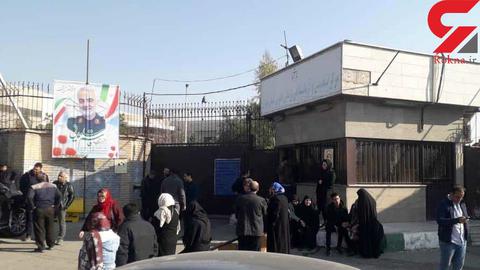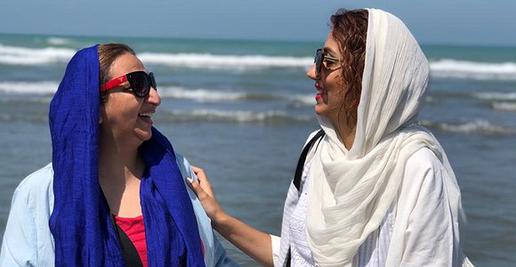“When we heard that the plane had crashed the world crashed on our heads, but when the news came that the plane had not crashed because of technical problems and that our loved ones had died because of a missile being fired at it, it was not only sadness that was killing us but also anger. Now, instead of sympathy, what we are getting a few times every day are calls and text messages warning us not to communicate with the media or send them pictures.”
This is how the mother of a victim of the Ukrainian Airlines Flight 752 describes what she went through. “My son was an ordinary person, like many others,” she tells IranWire. “He was neither an elite student for the university to issue a statement for him nor an Olympic medalist to be famous. Nor was he a political activist flying to exile. But he fell victim to the policies of the country that he loved wholeheartedly. He had a thousand hopes and left Iran to fulfil them. I supported him, too. I told him: ‘if you remain here you will just run around and end up being a tenant in your old age.’ And now he is gone.”
The grieving mother — who has asked for her name not to be disclosed because she has been threatened by security agencies — says the agents contacted her several times after it was revealed that a missile had brought down the plane. They wanted her to give interviews to the domestic media. “They said, ‘come and talk to our own media, not to the anti-regime media,’” she says. “I said, ‘you want me to say that it was America’s fault? You will never hear me whitewash you.’”
She says that some families have been forced to sit in front of the cameras and talk about “forgiving human error” — a human error that cost the lives of 176 innocent human beings. “In a video, they had the grieving father of Mehdi Eshaghi sit in front of the camera and say, ‘God giveth and God taketh away. Something happened, regardless of whether it was human error or something else. It is up to the government and our own courts to investigate.’ Only God knows what was going inside him when he was forced to sit and say, ‘We are the foot soldiers of this regime.’”
The mother is referring to a two-hour documentary broadcast online by Mashregh News, reputed to be close to Iranian intelligence and security agencies, which includes interviews with members of the families of some of those killed in the shooting down of the Ukrainian passenger plane. One of these families is Hasani Saadi’s. Photographs of Saadi next to General Soleimani have made the news since his death. After days of trying, and following DNA tests, the family succeeded in getting his remains — literally what remained of his body — so they could bury him.
Taking Dead Bodies Hostage
Over the last few days a number of news sources have reported that the families of the victims have been threatened and intimidated by the security agencies [Persian link]. According to these reports, they have been told that if they want the remains of their loved ones they must refrain from giving interviews to Persian-language media outside of Iran.
According to Mohammad Shahriari, an official from Tehran’s Criminal Court, as of now the bodies of 67 passengers who died in the plane disaster have been returned to their families. Shahriari has announced that after a family has been informed that the identity of their loved one has been established they can report to the Medical Examiner with the necessary documents and claim the body. He asked the families not to go to the Medical Examiner before they have been notified.
In the meantime, many families say that their every move is under surveillance and security forces even interfere in their private mourning ceremonies and make threatening calls without a hint of sympathy.
“They have contacted us from the TV News Network and other Iranian news agencies for interviews,” another victim’s family member tells IranWire. “How can I trample on the blood of my loved one and talk to those who trumpeted the regime’s lies and said that the plane could not possibly have been downed by a missile?” she says. “After all these lies and attempts at covering up the truth, they must give me one reason why I should trust their lying establishment.”
According to her, they were called several times by unlisted numbers in the middle of mourning ceremonies and told to ask Persian-language media outside Iran to remove photographs of their loved ones from their sites. She says the calls left her “with no doubt that we were being surveilled. All the time I was explaining to them that these pictures were posted widely on the web long before the news [that the plane was shot down by a missile] and that the media have them and, in this situation, we cannot control them. Can you imagine how they answered me? ‘Block those pages and limit who can view them!’”
“I told them, ‘shame on you! Are you taking these burned bodies hostage?’” she says. “Ma’am, we are beyond fear! We have nothing to lose. There is no hope and somebody who has no hope is not afraid of anything.”
Threats and intimidations are nothing new for the families of victims of various misdeeds carried out by the Iranian government. During the November nationwide protests, when many Iranian citizens were killed, injured or arrested, most of the families who chose not to stay silent and cried for justice were harassed and threatened by security agencies.
A typical example is the family of Pouya Bakhtiari, a young man of 27 who was shot dead in front of his mother and sister in Mehr Shahr in Karaj during the protests against the steep rise of gas prices. Bakhtiari’s family called on Iranian people to attend the traditional 40th day mourning ceremonies for him in Behesht Sakineh Cemetery in Karaj on December 26. In his Instagram posts, his father wrote that the ceremonies would be held no matter what and told the media that he and his wife had been summoned. But two days before the ceremonies were to take place, Pouya Bakhtiari’s parents and three other members of his immediate family were arrested and taken to an unknown location. As of this report, Bakhtiari’s father, Manouchehr Bakhtiari, is still under arrest.
This treatment by security agencies is not limited to the families of those killed during November protests or of the shooting down of the Ukrainian airliner. There are many reports of violence against gatherings to commemorate victims in various Iranian cities. The candles people lit were crushed by the security forces, and they were asked: “Why didn’t you light candles when Soleimani was martyred?”
Related Coverage:
Police Violently Suppress Protesters in Isfahan and Shiraz, 13 January 2020
January 12, 2020: Police Open Fire on Protesters in Tehran, 12 January 2020
Iranians Call Their Leaders “Bi Sharaf”, 12 January 2020
Iran’s Saturday of Rage: Online Anger Pours into the Streets, 11 January 2020
visit the accountability section
In this section of Iran Wire, you can contact the officials and launch your campaign for various problems

























comments